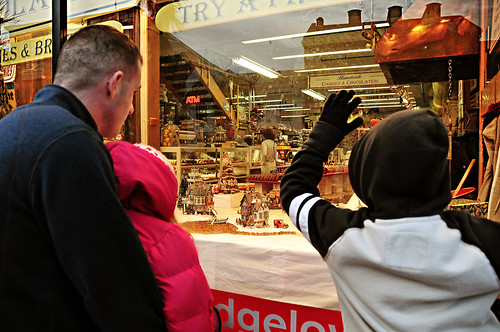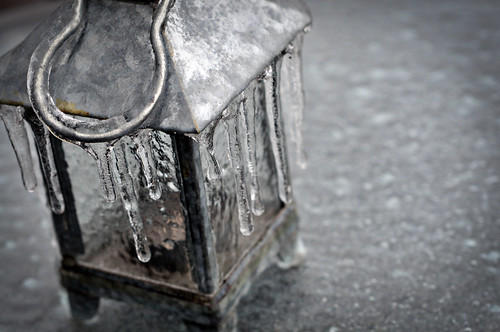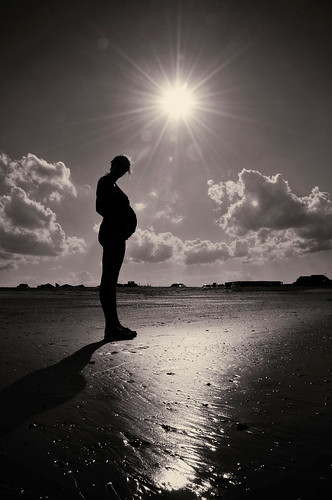by Christie Purifoy | Dec 16, 2011 | Advent, book of quotations, Waiting

“Waiting is open-ended. Open-ended waiting is hard for us because we tend to wait for something very concrete, for something that we wish to have. Much of our waiting is filled with wishes: ‘I wish that I would have a job. I wish that the weather would be better. I wish that the pain would go.’ We are full of wishes, and our waiting easily gets entangled in those wishes. For this reason, a lot of our waiting is not open-ended. Instead, our waiting is a way of controlling the future. We want the future to go in a very specific direction, and if this does not happen we are disappointed and can even slip into despair. That is why we have such a hard time waiting: we want to do the things that will make the desired events take place. Here we can see how wishes tend to be connected with fears.
But Zechariah, Elizabeth, and Mary were not filled with wishes. They were filled with hope. Hope is something very different. Hope is trusting that something will be fulfilled, but fulfilled according to the promises and not just according to our wishes. Therefore, hope is always open-ended.”
– Henri Nouwen, “A Spirituality of Waiting”
by Christie Purifoy | Dec 15, 2011 | Advent, Chicago, Waiting

When my life is in waiting mode, I sometimes wish I could go to bed and just sleep for a few months. Oblivion seems so much more appealing than the hard, day-to-day of waiting.
Waiting is painful, and it often feels pointless too. So much so, that I fantasize about hitting some kind of cosmic fast-forward button.
The firstborn feels it too. For weeks now she’s been murmuring the same refrain: “I wish that today was Christmas Eve!” From my grown-up perspective, I can clearly see that she, in her impatience, is wishing for the lesser. The not quite-as-good.
I always tell her, “No! You don’t want that. It would mean that Christmas is almost over.”
What I’m trying to say, but can never quite convince her of, is that Christmas will certainly come, so why wish away all of the good that happens in the meantime? The daily Advent calendar, the classroom parties, the cookie baking. It may not be what we’re waiting for, but it is good nonetheless. And Christmas will come. Speeding it up doesn’t make it any more of a sure thing.
Other times, waiting is less enjoyable. That’s when I fantasize about becoming a modern-day Rip Van Winkle. God, just wake me up when it’s all over. Wake me up when it gets good.
This is when age comes in handy. It’s good to no longer be eight years old. Because I can remember.
I can remember the painful waiting of our first few married years. All we wanted was to leave Texas and live in a big city. We had exciting dreams but felt painfully cramped by our current circumstances. An uninspiring white box of an apartment. The heat and humidity of a Texas river valley. The fact that we couldn’t go anywhere unless we started up the car.
Moving to Chicago was a dream fulfilled, and the magic of it never really wore off. I could still feel it even ten years later. There was our corner apartment in a converted jazz-age luxury hotel. Our windows were at tree-top height, and the views included the lake and the museum’s grand front lawn. There were the honey locust trees that gave every neighborhood street a golden canopy each October. There was a downtown skyline that glittered, and a lake that sometimes looked like a wind-swept arctic wilderness. And there was snow! But best of all, we could walk everywhere.
I could hardly step outside my door without being grateful that God had brought us to this place. I would often marvel to myself that this – this! – is what he’d had in mind all those years of our waiting. The friends. The church. The old, ivy-covered buildings. The bookstores like underground caves stuffed full of treasure. It was good, but it was made even better because we had longed for it before we ever even knew exactly where it could be found.
I remember these things and know that it is precisely the discomfort of waiting that urges us forward into the plans God has prepared for us. The people. The places. We long for them before we even know their names. But this is good and necessary. Because when the things of God are finally revealed in our lives … we recognize them. We know them. And we know exactly who to thank.
“Many, O Lord my God, are the wonders you have done. The things you planned for us no one can recount to you; were I to speak and tell of them, they would be too many to declare.”
Psalm 40:5
by Christie Purifoy | Dec 14, 2011 | Advent, Jesus, Scripture, Waiting

I can’t say with certainty what kind of Messiah the Jewish people were waiting for two thousand years ago. However, I’m fairly sure that Jesus was not it.
I imagine that many were waiting for a powerful king. A revolutionary. A fiery-tongued savior with a sword in his hand.
What they got was a carpenter from Nazareth who spent his time with the wrong sort of people.
I’m sure that if any of the disciples had been told before meeting Jesus that their Messiah would turn out to be a local carpenter who turned the other cheek, they would have been disappointed. What about the glorious daydream they’d worked up during the long years of their wait? Why couldn’t God do it that way? What kind of promised-kept was this?
And yet, I doubt that any of those men felt disappointed as they began to preach after Pentecost. I think they would have said that the Jesus-who-is far outshines the small revolutionary of their earlier imaginings. By then, they could see reality with God’s own eyes, like Stephen, who “looked up to heaven and saw the glory of God, and Jesus standing at the right hand of God” (Acts 7:55).
God’s plans often surprise us. It seems they rarely play out exactly as we’ve pictured. And yet, I do not think it is a matter of trading our beautiful hopes for God’s slightly-less-exciting version. Ultimately, this life is not about the sacrifices we make for God. It’s about God’s unbelievably good love for us.
Accepting God’s version may sometimes look like settling for less, but it is always, always more. It is always better.
Jesus was and is the ideal Messiah. A king and a servant. A lion and a lamb.
God has long been writing the perfect story. In the world. In our lives. At Advent we remember how good the story is. We also remember that we haven’t even made it to the ending yet. The villain has not yet been vanquished.
“And then the lawless one will be revealed, whom the Lord Jesus will overthrow with the breath of his mouth and destroy by the splendor of his coming” (2 Thessalonians 2:8).
The world’s happily-ever-after is not yet here, but it is breaking in. Can you see it?
by Christie Purifoy | Dec 13, 2011 | Advent, Family, motherhood, Waiting

It is St. Lucia’s Day, the day the poet John Donne called “the year’s midnight.” It is a short, dark day even here in Florida, thanks to a windy, rainy nor’easter.
The firstborn and I are determined to mark the day as they would in Sweden. Whether this is because of our drop of shared Swedish blood, or because we are firstborn girls, I’m not sure. But, we do it.
We make a crown: soft wool felt for the evergreen leaves, battery-powered candles for the light. She lays out a white nightgown and red ribbon sash while I set her alarm clock. She’s never used an alarm clock, and I must show her three times how to turn it off. She practices her lines for me one more time: “St. Lucia invites you to breakfast!”
We forego the traditional saffron buns, but the gingerbread cookie replacements are prepped and waiting on a tray.
“Goodnight, Lucy/Lily,” I say, as I shut her bedroom door on the eve of Lucy’s day.
Tiptoeing through the dark hallway, straining my eyes to avoid the Lego casualties scattered across the tile, I remember how dark my days were before this girl. Those days of praying and waiting and living without.
I remember, too, how bright the full moon was that winter night when I first knew that she was on her way. Nine years ago it was a bright light of answered prayer, of hopes fulfilled.
It is winter again. I know now that when the days are short and the nights are long, the only right way to see ahead is to look back.
So, I look back and remember: “… weeping may remain for a night, but rejoicing comes in the morning” Psalm 30:5.

by Christie Purifoy | Dec 9, 2011 | Advent, Jesus, Waiting

The wintery cold has been sinking lower and lower on the weatherman’s map each night. Finally, the chill of that blue boundary line reaches down to embrace even Florida. The wind feels icy now, though the weatherman says that the still-ripening oranges on our backyard tree are safe.
For me, winter arrives just as this season of waiting begins to feel less than joyful. Not quite two weeks in, waiting feels more like real waiting, less like the thrilling performance of waiting I experience during Advent’s first week. In other words, it feels difficult. Wearying.
Even the words I write come less easily. Like carving them, slowly, out of ice.
The truth is, we spend so much of our lives waiting. For some of us, Advent seems to last for years, rather than days. We cry “Come, Lord, come!” And we keep on crying, caught somewhere in the perpetual coming but not yet here. Always Advent, never Christmas. Or, as Lewis wrote so memorably in The Lion, The Witch, and the Wardrobe, “Always winter and never Christmas; think of that!”
As a writer (well, honestly, as a human being!) it is tempting to set up permanent camp in the land of answers. Somehow, Advent gives me permission to ask questions without worrying whether or not I also have the answers. During Advent, I remember that it is good to voice our most pressing questions aloud and then sit in the quietness that follows.
“My soul faints with longing for your salvation, but I have put my hope in your word. My eyes fail, looking for your promise; I say, ‘When will you comfort me?’ … How long must your servant wait?”
(Psalm 119: 81, 84).
Perhaps because Advent prompts me to reflect on the heavy realities of darkness, silence, and waiting, it also pushes me past my usual zone of comfortable optimism, my I’m-okay-you’re-okay-we’re-all-okay assumption. Truthfully, many of us are not okay.
Some of us are hurting right now, and some of us are not, but during Advent, we join together to sing an ancient refrain. One that is so powerful, so universal, it echoes backwards and forwards in time, from the cross to David and back to us today: “But you, O Lord, be not far off; O my Strength, come quickly to help me” (Psalm 22: 19).
by Christie Purifoy | Dec 6, 2011 | Advent, Jesus, Scripture, Waiting

Living in a one-hundred-year-old apartment in the city, we took our baths in a narrow, enameled tub. Back then, I found the idea of a jetted, whirlpool bathtub very appealing. I live in suburbia now, and I have just such a tub. Alas, the reality is less exciting than the fantasy.
I think I tried using the jets once. As it turns out, I don’t much like soaking in bubbles with the sound of a motor in my ears. Now the jets only get turned on when the big kids want to terrify the two-year-old during bathtime.
Even worse, without an apartment-building-sized boiler, we don’t actually have enough hot water to fill this fancy whirlpool bath to the top. I’ve learned the hard way to open only the hot water tap and not to let it run past halfway, lest I find myself with a tub full of lukewarm water.
Still, I do occasionally indulge (minus the jets and with the tub less than full). Recently, my soak was disturbed by the shrieks of my arguing children. I sank down beneath the water hoping to block out the noise and was surprised by the enveloping silence.
Immediately, I was a kid again. At what other stage of life do you spend so much time going pruney beneath the bathwater or shutting out the sounds of Marco-Polo cries at the swimming pool?
I’d forgotten how loud this kind of watery silence actually is. There is a whole other world in this silence: the rush of blood, the wheeze of each breath. It is a noisy world within a world, though it is generally unnoticed, unheard.
I typically imagine silence to be a kind of emptiness. A kind of nothingness.
The gap between Old and New Testaments suggests that God was silent for many, many years before the birth of his son.
I wonder what this silence signified. Emptiness? Distance? Or, could it have been, a world within a world?
When the infant Jesus was presented at the Temple, there were two waiting for him. Two, prepared to recognize and honor him: Simeon and Anna.
In these two we glimpse the truth. God’s silence weighed so heavy on them that they knew he was neither distant nor inactive. They knew their Christ was coming.
One day, he arrives. The silence erupts. The angels sing.
On this day, many can see what had always been there unnoticed and unheard. Songs of joy and prayers of thanksgiving are lifted to the heavens over one tiny head.
But Simeon and Anna are not surprised. They have long been listening to the sound of blood pumping and breath rising. They know that God’s silence is anything but empty.







